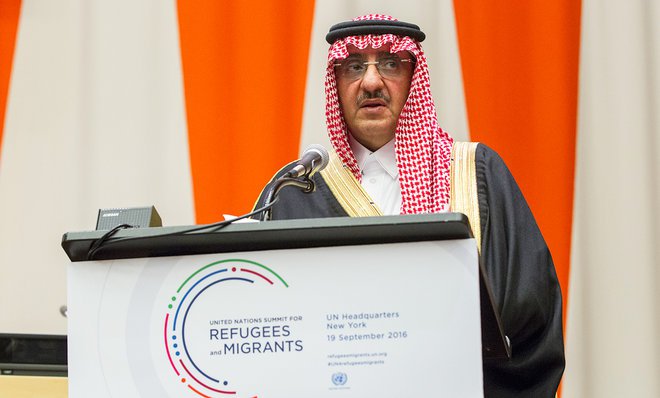
Striving for peace with unlimited aid
Crown Prince Mohammed bin Naif, who is leading the Saudi delegation to the 71st session of the UN General Assembly in New York, confirmed on Monday that the Kingdom's handling of the issue of refugees, which is a result of ethnic conflicts, wars, disasters and struggle, is based on the principles and instructions of Islamic religion which calls for peace.
In his speech at the UN Summit for Refugees and Migrants, the crown prince outlined the assistance Saudi Arabia has provided to Syrian refugees.
“Saudi Arabia has taken 2.5 million Syrians since the beginning of the conflict,” he said. “In addition, it has provided complete support to the countries that are hosting them in the region.”
He said Saudi Arabia has also provided free education to 141,000 Syrian students and 285,000 Yemeni students. Keen to create one window for giving out the Kingdom’s relief and humanitarian aid, Custodian of the Two Holy Mosques King Salman ordered the establishment of King Salman Humanitarian Aid and Relief Center, the crown prince told the summit.
The assistance provided by the Kingdom to Yemeni refugees based in Djibouti and Somalia has recently amounted to more than $42 million, he said. To meet the humanitarian needs of the friendly Yemeni people, the Kingdom has donated about $500 million, the crown prince added.
“Saudi Arabia is ranked third in the world in terms of the size of relief, humanitarian and developmental aid,” he said. “The assistance provided by Saudi Arabia over the last four decades amounted to some $139 billion.”
He said the refugee crisis, which is generated from racial disputes, wars, and catastrophes, requires that “we unify our efforts to deal with it with the utmost responsibility to reduce its negative impacts on humanity.”
The 71st Session of the UN General Assembly begins on Tuesday under a dark cloud which is the Syrian conflict and the challenge of facing an enormous wave of refugees.
The crown prince arrived in New York on Sunday evening, heading the Saudi delegation.
The official delegation accompanying the crown prince included Prince Abdul Aziz bin Saud bin Naif, adviser to the minister of interior; Minister of State and Cabinet member Musaed Al-Aiban; Minister of Finance Ibrahim Al-Assaf; Minister of Commerce and Investment Majed Al-Qassabi; Minister of Culture and Information Adel Al-Toraifi and Minister of Foreign Affairs Adel Al-Jubeir.
The crown prince will deliver a major speech on Wednesday to present Saudi Arabia’s views on what is happening in the region. He is also expected to meet US President Barack Obama, Pakistani Prime Minister Nawaz Sharif and many other world leaders in order to discuss bilateral relations, the Syrian conflict, the conflict in Yemen and the refugee crisis.
The UN Refugee Agency said in a report that the world was now witnessing the highest levels of displacement ever recorded. An unprecedented 65.3 million people around the world have been forced from their homes. Among them are nearly 21.3 million refugees, over half of whom are under the age of 18. There are also 10 million stateless people who have been denied nationality and access to basic rights such as education, health care, employment and freedom of movement. There are nearly 34,000 people forcibly displaced every day as a result of conflict or persecution.
US Secretary-General Ban Ki-moon said in the opening session of the summit that United Nations was launching a new campaign called, “Together — Respect, Safety and Dignity for All.”
“Acting together, we can respond to rising xenophobia and turn fear into hope,” he said. “I call on world leaders to join this campaign and commit to upholding the rights and dignity of everyone forced by circumstances to flee their homes in search of a better life.”Historically, Saudi Arabia has taken a very prominent humanitarian role in serving crisis-stricken communities around the world. The King Salman Humanitarian Aid and Relief Center has donated billions of dollars to refugees in Syria, Yemen, Palestine and other areas. The situation in Syria is particularly troubling as world leaders convene in New York.
On Monday, the UN special envoy for Syria Staffan de Mistura said that the cease-fire following last Friday’s US-Russian agreement was largely holding but that desperately-awaited humanitarian convoys are unable to move due to a delay in getting permits from the Syrian government. “It is particularly regrettable because we are losing time,” de Mistura told a press briefing in Geneva.
There are 13.5 million people in Syria in need of humanitarian assistance; 4.8 million Syrians are refugees, with 6.5 million being displaced within Syria. Half of those affected are children.
The conflict threatens an entire generation of Syrians. The United Nations Refugee Agency said in a new report that in 2009, 94 percent of Syrian children attended primary and lower secondary school. In June 2016 only 60 percent were in school, leaving 2.1 million children and adolescents in the country without access to education. In fact, the urgency of collective world effort is greater than at any other time.






















